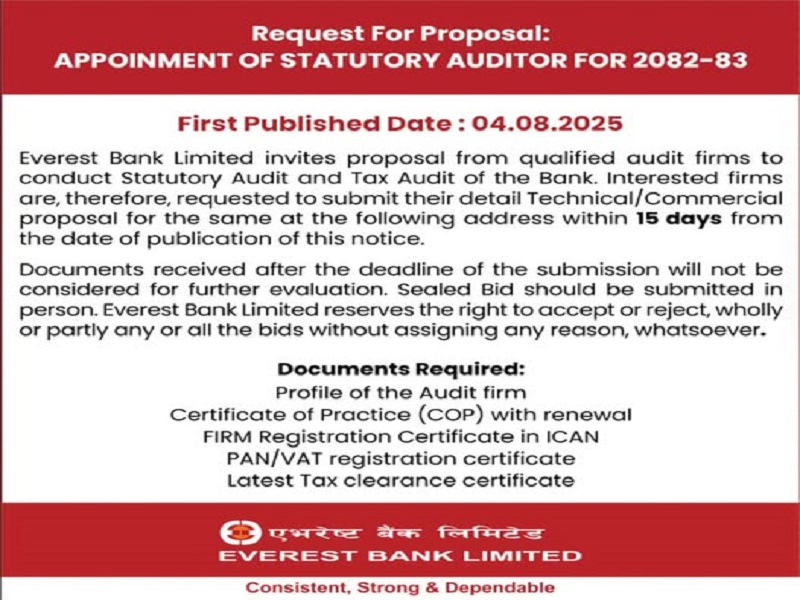Everest Bank Initiates Transparent Selection Process for Statutory Auditor for Fiscal Year 2082–83
5th August 2025, Kathmandu
In a move that underscores its commitment to robust corporate governance and financial transparency, Everest Bank Limited has officially issued a public Request for Proposal (RFP) for the appointment of a Statutory Auditor and Tax Auditor for the upcoming fiscal year, 2082–83.
Everest Bank Auditor RFP
The formal announcement of Everest Bank Auditor RFP, first published on August 4, 2025, invites applications from all eligible and qualified audit firms, setting a clear and competitive framework for the selection process. This initiative highlights the bank’s dedication to appointing a reputable and competent auditing partner to ensure its financial statements and internal controls are in full compliance with national and international standards.
The RFP outlines a meticulous selection process, requiring interested audit firms to submit comprehensive Technical and Commercial Proposals. The deadline for these submissions is set for August 19, 2025, which is exactly 15 days from the date of the public notice. To maintain the integrity and confidentiality of the process, the bank has mandated that all proposals must be submitted in a sealed format and in person. This strict protocol is a standard practice for high-stakes procurement to ensure that all bids are treated with impartiality and fairness.
Strict Deadline and Submission Protocol
Everest Bank has issued a firm directive regarding the submission deadline, stating unequivocally that late submissions will not be entertained under any circumstances. The bank’s notice warns that any proposal received after the specified time and date will be summarily rejected without any form of evaluation. This stringent adherence to the deadline is a key element of a fair and timely process, ensuring that all bidders are held to the same standards.
Furthermore, the bank has reserved the right to accept or reject any or all proposals, whether in full or in part, without providing a reason. While this is a standard clause in public tenders, it provides the bank with the necessary flexibility to make a final decision based on a comprehensive assessment of the firms, their capabilities, and their alignment with the bank’s internal and regulatory requirements. This ensures the bank can select the most suitable partner for this critical role.
Mandatory Document Checklist for Bidders
To be considered for the role of Statutory Auditor, firms must provide a detailed set of documents as part of their proposal. This rigorous checklist is designed to verify the firm’s legal standing, professional competence, and financial compliance. The required documents include:
- Firm Profile: A comprehensive overview detailing the firm’s history, organizational structure, key personnel, and a proven track record, particularly within the banking and financial services sector.
- Certificate of Practice (COP) with Renewal: This document is crucial as it validates that the firm and its partners are licensed and authorized by the regulatory body to perform auditing services.
- ICAN Registration Certificate: This confirms that the audit firm is officially registered with the Institute of Chartered Accountants of Nepal (ICAN), the statutory body that governs the accounting and auditing profession in the country. This registration is a prerequisite for any firm wishing to conduct audits in Nepal.
- PAN/VAT Registration Certificate: This serves as proof of the firm’s tax registration, demonstrating its compliance with the country’s tax laws.
- Latest Tax Clearance Certificate: This is a mandatory document that confirms the firm has fulfilled all its tax obligations and is in good standing with the Inland Revenue Department, further establishing its credibility and financial discipline.
These strict requirements ensure that only highly qualified and compliant firms are considered for the role, which is essential for a bank that is a public trust institution.
The Significance of the Auditor’s Role and Corporate Governance
As a prominent commercial bank in Nepal, Everest Bank’s selection of its statutory auditor is a matter of paramount importance. The auditor’s role extends beyond simply verifying financial statements; they are tasked with providing an independent and objective assessment of the bank’s financial health, internal control systems, and adherence to all regulatory frameworks, including those set by the Nepal Rastra Bank (NRB). This independent oversight is critical for maintaining market integrity and bolstering stakeholder confidence.
Everest Bank, renowned for its tagline “Consistent, Strong & Dependable,” has consistently upheld a strong public image as a trustworthy and reliable financial institution. The transparent process for appointing a statutory auditor for FY 2082–83 is another clear step in strengthening its governance framework. It assures investors, customers, and regulators that the bank is committed to the highest standards of financial oversight and professional accountability. This move is crucial for enhancing the bank’s reputation and reinforcing its position as a key player in Nepal’s financial landscape.
Interested audit firms are strongly advised to meticulously prepare their proposals and submit them well in advance of the deadline. Given the highly competitive nature of such appointments, firms with a proven track record of excellence in the banking sector are likely to have a competitive edge.
For More: Everest Bank Auditor RFP







